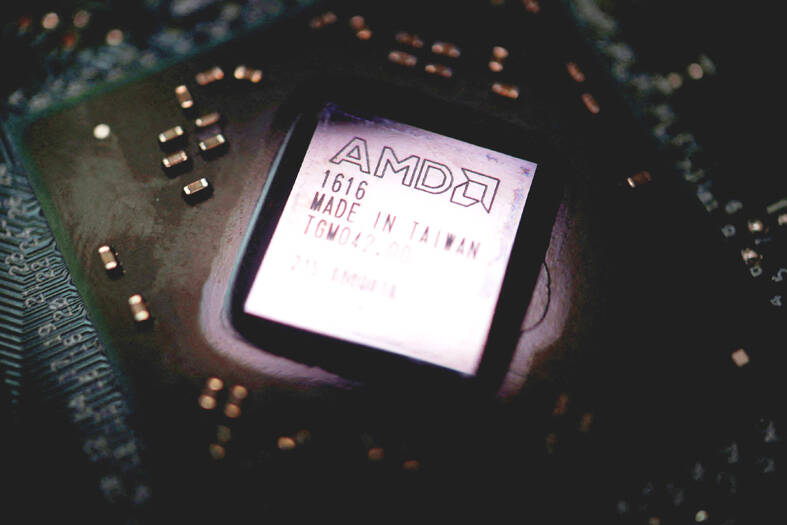Advanced Micro Devices Inc (AMD) hit a US government roadblock in attempting to sell an artificial intelligence (AI) chip tailored for the Chinese market, people familiar with the matter said, part of Washington’s crackdown on the export of advanced technologies to the country.
AMD had hoped to gain a green light from the US Department of Commerce to sell the AI processor to Chinese customers, said the people, who asked not to be identified because the situation is private.
The chip has lower performance than what AMD sells outside of China and was designed to meet US export restrictions, they said.

Photo: Reuters
However, US officials told AMD that the chip was still too powerful and that the company must obtain a license from the department’s Bureau of Industry and Security to sell it, the people said.
AMD did not have an immediate comment, while the bureau declined to comment.
It was not yet clear whether AMD is applying for a license.
US President Joe Biden’s administration in 2022 unveiled an initial set of export controls and bolstered them in October last year to include more technology and curb sales to intermediary nations that might undermine the ban.
The tighter controls prevented Nvidia Corp and AMD from selling their most powerful AI chips to China, forcing them to find workarounds.
Nvidia immediately responded with a reduced-performance modified model, whereas AMD has not publicly discussed its efforts to develop a new AI processor for the country.
AMD had less of a foothold in the Chinese AI chip industry than Nvidia, which had a large share of that market prior to the ban.
However, AMD is now going after the AI chip market more aggressively after launching a new MI300 lineup in December last year that is to challenge processors from Nvidia.
The China-tailored product has been referred to as MI309, the people said.
It was not clear which Chinese customer was trying to buy the AMD AI chips. That factor could influence whether the company is able to secure a license, should the chipmaker move forward.
Leading Chinese tech firms, including Tencent Holdings Ltd (騰訊) and Baidu Inc (百度), have said they have stockpiled enough powerful chips from Nvidia — the types that are now subject to US controls — to advance their chatbots’ capabilities for another year or two.
Meanwhile, Huawei Technologies Co (華為) is developing its own AI semiconductors and chipmaking capability that could eventually help Chinese companies fill the gap created by the US ban.

DIVIDED VIEWS: Although the Fed agreed on holding rates steady, some officials see no rate cuts for this year, while 10 policymakers foresee two or more cuts There are a lot of unknowns about the outlook for the economy and interest rates, but US Federal Reserve Chair Jerome Powell signaled at least one thing seems certain: Higher prices are coming. Fed policymakers voted unanimously to hold interest rates steady at a range of 4.25 percent to 4.50 percent for a fourth straight meeting on Wednesday, as they await clarity on whether tariffs would leave a one-time or more lasting mark on inflation. Powell said it is still unclear how much of the bill would fall on the shoulders of consumers, but he expects to learn more about tariffs

NOT JUSTIFIED: The bank’s governor said there would only be a rate cut if inflation falls below 1.5% and economic conditions deteriorate, which have not been detected The central bank yesterday kept its key interest rates unchanged for a fifth consecutive quarter, aligning with market expectations, while slightly lowering its inflation outlook amid signs of cooling price pressures. The move came after the US Federal Reserve held rates steady overnight, despite pressure from US President Donald Trump to cut borrowing costs. Central bank board members unanimously voted to maintain the discount rate at 2 percent, the secured loan rate at 2.375 percent and the overnight lending rate at 4.25 percent. “We consider the policy decision appropriate, although it suggests tightening leaning after factoring in slackening inflation and stable GDP growth,”

Meta Platforms Inc offered US$100 million bonuses to OpenAI employees in an unsuccessful bid to poach the ChatGPT maker’s talent and strengthen its own generative artificial intelligence (AI) teams, OpenAI CEO Sam Altman has said. Facebook’s parent company — a competitor of OpenAI — also offered “giant” annual salaries exceeding US$100 million to OpenAI staffers, Altman said in an interview on the Uncapped with Jack Altman podcast released on Tuesday. “It is crazy,” Sam Altman told his brother Jack in the interview. “I’m really happy that at least so far none of our best people have decided to take them

As they zigzagged from one machine to another in the searing African sun, the workers were covered in black soot. However, the charcoal they were making is known as “green,” and backers hope it can save impoverished Chad from rampant deforestation. Chad, a vast, landlocked country of 19 million people perched at the crossroads of north and central Africa, is steadily turning to desert. It has lost more than 90 percent of its forest cover since the 1970s, hit by climate change and overexploitation of trees for household uses such as cooking, officials say. “Green charcoal” aims to protect what